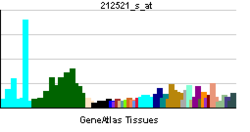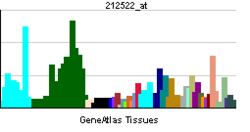- PDE8A
-
High affinity cAMP-specific and IBMX-insensitive 3',5'-cyclic phosphodiesterase 8A is an enzyme that in humans is encoded by the PDE8A gene.[1][2] Work by Sebastiaan Bol et al. showed that 5 different transcript variants and their corresponding isoforms are expressed in human macrophages, and suggests that this protein may be required by HIV-1 for its replication.[3]
References
- ^ Fisher DA, Smith JF, Pillar JS, St Denis SH, Cheng JB (Jul 1998). "Isolation and characterization of PDE8A, a novel human cAMP-specific phosphodiesterase". Biochem Biophys Res Commun 246 (3): 570–7. doi:10.1006/bbrc.1998.8684. PMID 9618252.
- ^ "Entrez Gene: PDE8A phosphodiesterase 8A". http://www.ncbi.nlm.nih.gov/sites/entrez?Db=gene&Cmd=ShowDetailView&TermToSearch=5151.
- ^ Bol SM, Booiman T, Bunnik EM, Moerland PD, van Dort K, Strauss JF 3rd, Sieberer M, Schuitemaker H, Kootstra NA, van 't Wout AB (Sep 2011). "Polymorphism in HIV-1 dependency factor PDE8A affects mRNA level and HIV-1 replication in primary macrophages". Virology. PMID 21920574.
Further reading
- Bass BL (2002). "RNA editing by adenosine deaminases that act on RNA.". Annu. Rev. Biochem. 71: 817–46. doi:10.1146/annurev.biochem.71.110601.135501. PMC 1823043. PMID 12045112. http://www.pubmedcentral.nih.gov/articlerender.fcgi?tool=pmcentrez&artid=1823043.
- Zauli G, Milani D, Mirandola P, et al. (2001). "HIV-1 Tat protein down-regulates CREB transcription factor expression in PC12 neuronal cells through a phosphatidylinositol 3-kinase/AKT/cyclic nucleoside phosphodiesterase pathway.". FASEB J. 15 (2): 483–91. doi:10.1096/fj.00-0354com. PMID 11156964.
- Glavas NA, Ostenson C, Schaefer JB, et al. (2001). "T cell activation up-regulates cyclic nucleotide phosphodiesterases 8A1 and 7A3.". Proc. Natl. Acad. Sci. U.S.A. 98 (11): 6319–24. doi:10.1073/pnas.101131098. PMC 33466. PMID 11371644. http://www.pubmedcentral.nih.gov/articlerender.fcgi?tool=pmcentrez&artid=33466.
- Wang P, Wu P, Egan RW, Billah MM (2002). "Human phosphodiesterase 8A splice variants: cloning, gene organization, and tissue distribution.". Gene 280 (1–2): 183–94. doi:10.1016/S0378-1119(01)00783-1. PMID 11738832.
- Strausberg RL, Feingold EA, Grouse LH, et al. (2003). "Generation and initial analysis of more than 15,000 full-length human and mouse cDNA sequences". Proc. Natl. Acad. Sci. U.S.A. 99 (26): 16899–903. doi:10.1073/pnas.242603899. PMC 139241. PMID 12477932. http://www.pubmedcentral.nih.gov/articlerender.fcgi?tool=pmcentrez&artid=139241.
- Gamanuma M, Yuasa K, Sasaki T, et al. (2003). "Comparison of enzymatic characterization and gene organization of cyclic nucleotide phosphodiesterase 8 family in humans". Cell. Signal. 15 (6): 565–74. doi:10.1016/S0898-6568(02)00146-8. PMID 12681444.
- Ota T, Suzuki Y, Nishikawa T, et al. (2004). "Complete sequencing and characterization of 21,243 full-length human cDNAs". Nat. Genet. 36 (1): 40–5. doi:10.1038/ng1285. PMID 14702039.
- Gerhard DS, Wagner L, Feingold EA, et al. (2004). "The status, quality, and expansion of the NIH full-length cDNA project: the Mammalian Gene Collection (MGC)". Genome Res. 14 (10B): 2121–7. doi:10.1101/gr.2596504. PMC 528928. PMID 15489334. http://www.pubmedcentral.nih.gov/articlerender.fcgi?tool=pmcentrez&artid=528928.
- Wu P, Wang P (2005). "Per-Arnt-Sim domain-dependent association of cAMP-phosphodiesterase 8A1 with IkappaB proteins". Proc. Natl. Acad. Sci. U.S.A. 101 (51): 17634–9. doi:10.1073/pnas.0407649101. PMC 539753. PMID 15596729. http://www.pubmedcentral.nih.gov/articlerender.fcgi?tool=pmcentrez&artid=539753.
Categories:- Human proteins
- Chromosome 15 gene stubs
Wikimedia Foundation. 2010.



